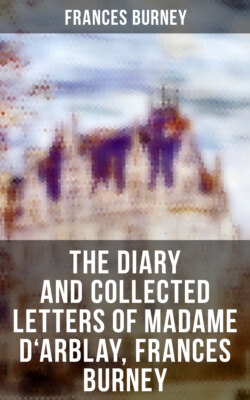Читать книгу The Diary and Collected Letters of Madame D'Arblay, Frances Burney - Frances Burney - Страница 124
На сайте Литреса книга снята с продажи.
The King again: Tea Table Etiquette
ОглавлениеMonday, Dec. 19—In the evening, while Mrs. Delany, Miss Port, and I were sitting and working together in the drawing-room, the door was opened, and the king entered.
We all started up; Miss Port flew to her modest post by the door, and I to my more comfortable one opposite the fire, which caused me but a slight and gentle retreat, and Mrs. Delany he immediately commanded to take her own place again.
He was full of joy for the Princess Elizabeth. He had been to the lower Lodge, and found her in a sweet sleep, and she was now, he said, in a course of James’s powders, from which he hoped her perfect restoration. I fear, however, it is still but precarious.
Mrs. Delany congratulated him, and then inquired after the whooping-cough. The children, he said, were better, and were going to Kew for some days, to change the air. He and the queen had been themselves, in the morning, to Kew, to see that their rooms were fit for their reception. He could not, he said, be easy to take any account but from his own eyes, when they were sick. He seems, indeed, one of the most tender fathers in the world.
I cannot pretend to write this meeting with the method and minuteness of the first; for that took me so long, that I have not time to spare for such another detail. Besides the novelty is now over, and I have not the same inducement to be so very circumstantial. But the principal parts of the conversation I will write, as I recollect.
Our party being so small, he made all that passed general; for though he principally addressed himself to Mrs. Delany, he always looked round to see that we heard him, and frequently referred to us.
I should mention, though, the etiquette always observed upon his entrance, which, first of all, is to fly off to distant quarters—and next, Miss Port goes out, walking backwards, for more candles, which she brings in, two at a time, and places upon the tables and pianoforte. Next she goes out for tea, which she then carries to his majesty, upon a large salver, containing sugar, cream, and bread and butter, and cake, while she hangs a napkin over her arm for his fingers.
When he has taken his tea, she returns to her station, where she waits till he has done, and then takes away his cup, and fetches more. This, it seems, is a ceremony performed in other places always by the mistress of the house; but here neither of their majesties will permit Mrs. Delany to attempt it.
Well; but to return. The king said he had just been looking over a new pamphlet, of Mr. Cumberland’s, upon the character of Lord Sackville,
“I have been asking Sir George Baker,” he said, “if he had read it, and he told me, yes, but that he could not find out why Cumberland had written it. However, that, I think, I found out in the second page. For there he takes an opportunity to give a high character of himself.”
He then enlarged more upon the subject, very frankly declaring in what points he differed from Mr. Cumberland about Lord Sackville; but as I neither knew him, nor had read the pamphlet, I could not at all enter into the subject.
Mrs. Delany then mentioned something of Madame de Genlis,166 upon which the king eagerly said to me,
“Oh, you saw her while she was here?”
“Yes, sir.”
“And—did she speak English?”
“Yes, sir.”
“And how?”
“Extremely well, sir; with very great facility.”
“Indeed? that always surprises me in a foreigner that has not lived here.”
Her accent is foreign, however; but her language is remarkably ready.
He then spoke of Voltaire, and talked a little of his works, concluding with this strong condemnation of their tendency:—
“I,” cried he, “think him a monster, I own it fairly.”
Nobody answered. Mrs. Delany did not quite hear him, and I knew too little of his works to have courage to say anything about them.
He next named Rousseau, whom he seemed to think of with more favour, though by no means with approbation, Here, too, I had read too little to talk at all, though his majesty frequently applied to me. Mrs. Delany told several anecdotes which had come to her immediate knowledge of him while he was in England, at which time he had spent some days with her brother, Mr. Granville, at Calwich. The king, too, told others, which had come to his own ears, all charging him with savage pride and insolent ingratitude.
Here, however, I ventured to interfere; for, as I knew he had had a pension from the king, I could not but wish his majesty should be informed he was grateful to him. And as you, my dear father, were my authority, I thought it but common justice to the memory of poor Rousseau to acquaint the king of his personal respect for him.
“Some gratitude, sir,” said I, “he was not without. When my father was in Paris, which was after Rousseau had been in England, he visited him in his garret, and the first thing he showed him was your majesty’s portrait over his chimney.”
The king paused a little while upon this; but nothing more was said of Rousseau.
